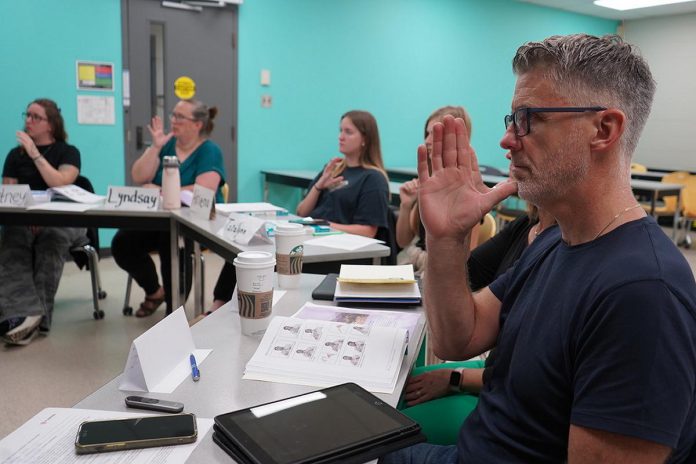
Whether you’re looking to boost your resume, want to improve your chance of success in the workplace, are starting on a new career path, or are just looking to learn a new language ahead of your summer travels, Fleming College’s continuing education courses will help you develop the skills you need.
Available in a wide range of subjects and delivery formats, Fleming College provides 50 certificate and specialization programs as well as access to an additional 900 courses through OntarioLearn, a collection of shared online post-secondary courses.
“Whether they’re a working professional or someone that’s trying to get into a certain role, many people are looking for flexible options to improve and upskill themselves while leading busy lives,” says Nick Stone, Associate Vice President, Applied Health at Fleming College. “Continuing education is all about finding a learning path that is tailored specifically to help someone reach their goals.”

Each of Fleming College’s three campuses offer a specialization when it comes to continuing education courses. Frost Campus in Lindsay is home to the school’s environmental and outdoor programs, while the Haliburton School of Art and Design offers courses for those expanding their artistic skills, and the Sutherland Campus in Peterborough offers a plethora of health, business, and trade-focused continuing education courses as well as those in various languages.
“With so many options, continuing education gives people a way to differentiate themselves when they’re in the job market,” says Stone.
Many of the courses are offered in a hybrid delivery format or completely online either synchronously or asynchronously, meaning continuing education learners do not have to be based in the Fleming College area to fully engage in the course.
With a full list of courses available at flemingcollege.ca/continuing-education/, courses run at various times throughout the academic school year and can accommodate the schedules of learners who have other personal or work commitments.
“The courses are tailored to the different wants and needs of that learner so that it provides ultimate flexibility,” says Stone. “These offerings run from a few hours over the weekend, to once a week for a few hours at night, to even a full semester of courses.”

While they can be taken individually, many of the courses can also be used as credits towards gaining a full specialization or certificate in an area of expertise. Inclusive of a range of sectors including culinary arts, education, technology, environmental, and business among others, such certificates can be earned when all applicable credits are received within a five-year period.
“You don’t have to make a full commitment right away. You can give a course a try without it taking too much of your time,” says Stone.
Fleming College has also added several new micro-credential courses to their continuing education offerings. Micro-credentials support students through targeted training in career-specific skills to address gaps between post-secondary education and the changing workforce landscape. They range in commitment up to 42 hours, demanding less time than a traditional diploma or certificate.
“You can take the modules as you need and earn digital badges, and then once you’ve earned all the badges you need in a series, you get the full micro-credential,” says Stone. “It’s an intentional laddering of courses towards a credential that would help you stay competitive in the workplace.”

Since the intention of micro-credentials is to meet the growing labour demands, Fleming College often works in partnership with local businesses.
Kawartha Ethanol, for example, has partnered with Fleming College to offer the “Introduction to Biomanufacturing” micro-credential course, which will prepare students for entry-level positions in the biomanufacturing sector.
Over 12 weeks, students will engage in 36 hours of hybrid-delivery learning which includes one three-hour lab session at the Sutherland Campus and a tour of the Kawartha Ethanol plant.
“Students start by learning some of the basics online, and then they go and spend time actually on site at Kawartha Ethanol seeing how everything they learned about works and how the biomanufacturing process runs,” Stone explains.

The flexibility of the micro-credential courses makes them ideal for employers who want to cover the cost of continuing education for their employees.
“The different levels of courses could help or improve your employees’ skills,” Stone says. “If you’re investing in the training of your employees, chances are they’ll maintain employment with you.”
No matter which type of continuing education course you take at Fleming College, course facilitators are all experienced experts in their field.

“The faculty we have are specialists in those specific programs,” Stone says. “It’s a very much hands-on, experiential approach that all of our courses provide.” He adds that this is especially the case for in-person and hybrid formats, where students have greater opportunities to connect with and learn from one another.
To learn more about continuing education courses, drop in to the Fleming College Open House on Saturday, March 22 from 10 a.m. to 1 p.m. at any of the college’s three campuses.
To browse all continuing education courses available at Fleming College, visit flemingcollege.ca/continuing-education/. For more information, email coned@flemingcollege.ca.
This branded editorial was created in partnership with Fleming College. If your organization or business is interested in a branded editorial, contact us.


























